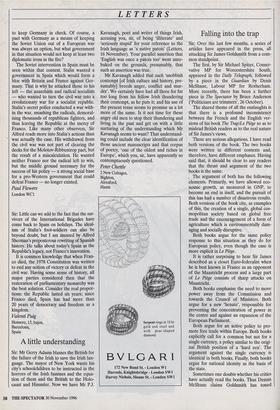Falling into the trap
Sir: Over the last few months, a series of articles have appeared in the press, all attacking Sir James Goldsmith from a com- mon standpoint.
The first, by Sir Michael Spicer, Conser- vative MP for Worcestershire South, appeared in the Daily Telegraph, followed by a piece in the Guardian by Denis McShane, Labour MP for Rotherham. More recently, there has been a further piece in The Spectator by Bruce Anderson (Politicians are trimmers', 26 October).
The shared theme of all the onslaughts is that there is a profound inconsistency between the French and the English ver- sions of his book The Trap/Le Piege so as to mislead British readers as to the real nature of Sir James's views.
These are serious allegations. I have read both versions of the book. The two books were written in different contexts and, therefore, have different emphases. Having said that, it should be clear to any readers that the thrust and argument of the two books is the same.
, The argument of both has the following elements. Primarily, we have allowed eco- nomic growth, as measured in GNP, to become an end in itself, and the pursuit of this has had a number of disastrous results. Both versions of the book cite, as examples of this, the creation of a single, global cos- mopolitan society based on global free trade and the encouragement of a form of agriculture which is environmentally dam- aging and socially disruptive.
Both books argue for the same policy response to this situation as they do for European policy, even though the case is more explicit in Le Piege.
It is rather surprising to hear Sir James described as a closet Euro-federalist when he is best known in France as an opponent of the Maastricht process and a large part of Le Piege consists of sharp attacks on Maastricht.
Both books emphasise the need to move power away from the Commission and towards the Council of Ministers. Both argue for a new 'Senate', responsible for preventing the concentration of power in the centre and against an expansion of the European Parliament.
Both argue for an active policy to pro- mote free trade within Europe. Both books explicitly call for a common but not for a single currency, a policy similar to the origi- nal British position of a 'hard ecu'. The argument against the single currency is identical in both books. Finally, both books argue for national identity as the basis of the state.
Sometimes one doubts whether his critics have actually read the books. Thus Dennis McShane claims Goldsmith has toned down his views on national separatism for the British audience when in fac, he repro- duces them almost verbatim.
I should make it clear that I myself do not agree with much of what Sir James has to say. While I share his views on nuclear energy and modern farming, I find his hos- tility to global free trade and migration wrong-headed and dangerous. However, I would not claim that he is inconsistent.
Sir James's critics should concentrate on making their case and not avoid debate by throwing up spurious and misleading alle- gations of inconsistency and intellectual dishonesty. It is they who have a case to anwer in that respect.
Stephen J. Davies
Manchester Metropolitan University, Rosamond Street West, Manchester
Bruce Anderson writes: If Dr Davies finds Sir James's hostility to global free trade wrong-headed and dan- gerous, I cannot understand why he thinks that the books have any value: all their arguments stem from that premise. I described the inconsistencies in some detail. Dr Davies does not challenge any of my points.
Le Piege is a coherent book, offering valuable insights into French official think- ing; it was designed to further Jimmy Gold- smith's political ambitions in France. The Trap is a bowdlerised version, much less coherent, designed to further his ambitions in British politics. The following contrasting extracts illustrate the difference. `Quels sont les pouvoirs qui devraient etre central- ises a Bruxelles? Principalement la defense, la diplomatie, la protection de l'environ- ment, ainsi que les pouvoirs necessaires pour garantir un marche libre a l'interieur de l'Europe' (Le Piege). 'What areas of responsibility should concern Brussels? Principally defence, diplomacy, protection of the environment and maintaining a free internal market within Europe' (The Trap). In Le Piege, Sir James's proposed European senate would uphold subsidiarity. In The Trap, the word senate does not appear, but subsidiarity is mentioned. `Subsidiarity has been used by Eurocrats to mask their lust for centralisation . . . the word itself is now hopelessly discredited.'
Le Piege contains the following ringing phrases: `L'Amerique cherche a imposer un libre-echangisme mondial. L'Europe reunie pent et doit s'en proteger;"Je fonde mes espoirs sur la France et sur les Francais.' Neither appears in The Trap.



















































































 Previous page
Previous page